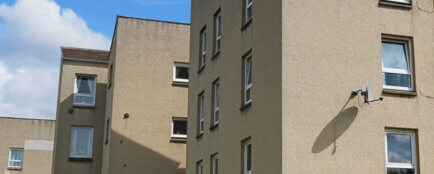When an apartment is not an apartment: the risks of illegal subletting
At first glance, it may look like a bargain – a reasonably priced apartment that quickly becomes available and the owner is in no hurry to sign. But students are often the victims of illegal subletting. A typical situation arises with city flats: the tenant acquires them from the municipality or the city district and continues to rent them out to students without their consent. They then pay the rent in good faith, without knowing that the contract is problematic from the start.
The problem is that the lease agreements for council flats usually explicitly state that subletting is only possible with the written consent of the owner. In the absence of such consent, this is a gross breach of contract that can lead to immediate termination. As a result, students as subtenants are often left without legal protection – even if they have paid properly, they can be evicted without compensation.
How to avoid the risk? Before signing a contract, it is advisable to check the land registry, where the actual owner of the apartment is listed. If the landlord claims to be a private person, but the owner is the city, it is a good idea to check whether the landlord has the right to sublet. Otherwise, there is a risk that the student is living “in the black” – and all the problems will eventually be shouldered.
Are you solving a similar problem?
Solutions Tailored for You
Our team of experienced attorneys will help you solve any legal issue. Within 24 hours we’ll evaluate your situation and suggest a step-by-step solution, including all costs. The price for this proposal is only CZK 690, and this is refunded to you when you order service from us.
I Need help
- When you order, you know what you will get and how much it will cost.
- We handle everything online or in person at one of our 6 offices.
- We handle 8 out of 10 requests within 2 working days.
- We have specialists for every field of law.
How college students live: statistics, barriers and reality
In the Czech Republic, the number of university students is around 300 000. Of these, a significant number live away from their parents – in halls of residence, in lodgings, or sharing accommodation with other students.
Dormitories are still the most affordable option, but they have their limitations – some dormitories have shared bathroom facilities in the hallway, rooms are small, equipment is often outdated and hygiene is not always ideal.
As far as prices are concerned: rent for a small independent flat in university cities (Prague, Brno, Olomouc, etc.) can be over 15,000-20,000 CZK per month without utilities and fees.Shared housing (a room in a shared flat) is usually significantly cheaper – the difference can be several thousand CZK. The main obstacles include:
- Lack of available capacity both in the dormitories and in the private rental sector.
- Rising rent and utility costs, which often exceed student financing options.
- Time pressure to find – the semester is approaching, capacity is disappearing, and students often have to sign contracts immediately, without the opportunity for long probing.
- Quality of housing – the facilities, the condition of the building, the standard of rooms or common areas often do not match the price.
From a legal point of view, there is also the risk that the lease or sublet may not be formally in order, which can make it difficult for students to exercise their rights. Many students look mainly at price and availability rather than legal protection, which can lead to inconvenience.
Tip for article
Tip: Most people do not distinguish between subletting and renting an apartment. However, from a legal point of view, they are very different institutions that carry different rights and obligations. In our article we have explained the differences between the two forms of housing.
Contract as basic protection: what not to forget
The tenancy agreement is the most important insurance for a student to ensure that his or her housing does not turn into a legal nightmare. Yet many university students sign contracts that are vague, incomplete or only verbal. This can backfire – without clear rules, it’s hard to get your apartment repaired, your security deposit refunded or your rent reduced.
The law requires three basic elements: who enters into the contract, what is the subject of the lease and for how much. This is the minimum. In practice, however, the contract should also contain other important points – the amount and due date of utility deposits, the terms of termination of the lease, the amount of the security deposit, the possibility of subletting or the clearly defined condition of the apartment at handover. A well-written contract protects both parties and prevents future disputes.
Students should also be cautious when sharing a flat. If only one of them signs the contract, the others may only be legally “guests” – and therefore without legal protection. It is safer if all tenants are named directly in the contract.
So always read the contract calmly and have it checked by a lawyer. An investment of a few hundred pennies can be worthwhile – especially if it’s a home worth tens of thousands a year.
Dormitories and hostels: different rules, same rights to decent conditions
Halls of residence are traditionally the most affordable form of student housing – financially and often in terms of location. But legally, they are different from traditional renting. Here, the student does not sign a tenancy agreement, but an accommodation contract. This is closer to a hotel or hostel arrangement than an apartment lease. This means that the hostel operator has greater powers but also a responsibility to ensure that conditions are functional and safe.
If there are defects in the dormitory – from mould to bedbugs to a malfunctioning heater – the student has the right to demand that they be removed, a discount on the accommodation or even compensation for damages. In extreme cases, students can leave the dormitory without penalty. The difference with a traditional tenancy is that the processes tend to be quicker and less formalised because it is short-term accommodation.
However, the reality shows that student halls of residence often suffer from outdated equipment, small space and shared facilities. According to surveys, many halls of residence in the country still have toilets and showers only in the corridor. Even so, the operator is obliged to provide a hygienic and health-safe environment.
Prevention and legal aid: how to avoid disputes and stress
There is a golden rule in student housing: it is better to prevent problems than to solve them later. Prevention starts when you are looking for an apartment or dorm. Students should always take a thorough look at the space, test the functionality of doors, windows or appliances and take photo documentation. A handover report with an accurate description of the condition of the apartment is valuable evidence – if it is missing, there is a risk that any dispute will be based on “word against word”.
The next key step is a good quality contract. This should clearly define not only the amount of the lease, but also the conditions for termination, the amount of the security deposit, the rules of subletting and the condition of the apartment. Contracts that are too brief or too one-sided can leave the student with nothing to fall back on in the event of a dispute.
But prevention is not just about the contract. It is also worth checking whether the landlord has the right to let the flat at all – for example, in the case of council flats, subletting without the council’s consent is a gross breach of contract.
And what if there is already a problem? Most students will not seek a lawyer, even if they would be entitled to a repair, rent reduction or cancellation. Yet a brief consultation can save thousands of dollars and unnecessary stress. Not letting things “fizzle out” is often the best investment in quiet study.
Summary
Student housing is full of pitfalls – from illegal subletting and unclear contracts to expensive or poor quality halls of residence and unreliable landlords. Thorough preparation can help avoid problems: check the landlord, insist on a clearly written contract, document the condition of the accommodation and report defects in writing. Although dormitories fall under a different legal regime than rental apartments, students have the right to hygienic and safe conditions. And if there is already a dispute, it is better to seek legal help early – it can save not only money, but also the peace of mind needed to study.
Frequently asked questions
Can I be evicted even if I pay my rent properly?
Yes, if it turns out that the flat was rented illegally – for example, a council flat without the council’s consent. The student then pays in good faith, but legally he or she is “on the water” and can lose the apartment. It is therefore important to check with the Land Registry who the actual owner of the flat is and whether the landlord has the right to sublet it.
What should the lease agreement contain?
In addition to the basic details (who enters into the contract with whom, what is the subject of the lease and the amount of rent), it is a good idea for the contract to provide for a security deposit, utility deposits, termination terms, the possibility of subletting and the condition of the apartment upon takeover. In the case of shared accommodation, it is safer if all tenants are listed in the contract, not just one.
How can I defend myself against bad conditions on campus?
In the dormitory, the student does not sign a traditional rental contract, but an accommodation contract. Even so, he or she has the right to have the defects repaired, a discount on the accommodation or, in extreme cases, to terminate the contract immediately. Everything must be reported in writing and ideally documented – if the manager does not respond, you can also contact the hygiene authorities or the Czech Trade Inspection Authority.




